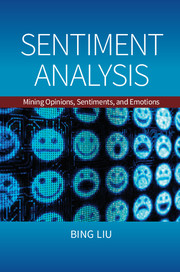Book contents
- Frontmatter
- Contents
- Preface
- Acknowledgments
- 1 Introduction
- 2 The Problem of Sentiment Analysis
- 3 Document Sentiment Classification
- 4 Sentence Subjectivity and Sentiment Classification
- 5 Aspect Sentiment Classification
- 6 Aspect and Entity Extraction
- 7 Sentiment Lexicon Generation
- 8 Analysis of Comparative Opinions
- 9 Opinion Summarization and Search
- 10 Analysis of Debates and Comments
- 11 Mining Intentions
- 12 Detecting Fake or Deceptive Opinions
- 13 Quality of Reviews
- 14 Conclusions
- Appendix
- Bibliography
- Index
13 - Quality of Reviews
Published online by Cambridge University Press: 05 June 2015
- Frontmatter
- Contents
- Preface
- Acknowledgments
- 1 Introduction
- 2 The Problem of Sentiment Analysis
- 3 Document Sentiment Classification
- 4 Sentence Subjectivity and Sentiment Classification
- 5 Aspect Sentiment Classification
- 6 Aspect and Entity Extraction
- 7 Sentiment Lexicon Generation
- 8 Analysis of Comparative Opinions
- 9 Opinion Summarization and Search
- 10 Analysis of Debates and Comments
- 11 Mining Intentions
- 12 Detecting Fake or Deceptive Opinions
- 13 Quality of Reviews
- 14 Conclusions
- Appendix
- Bibliography
- Index
Summary
In this chapter, we discuss the quality of reviews. The topic is related to opinion spam detection, but is also very different because low-quality reviews may not be spam or fake reviews, and fake reviews may not be perceived as low-quality reviews by readers because as we discussed in the last chapter, it is very difficult to spot fake reviews simply by reading them. For this reason, fake reviews may also be seen as helpful or high-quality reviews if the imposters write their reviews early and craft them well.
The objective of this task is to determine the quality, helpfulness, usefulness, or utility of each review (Kim et al., 2006; Zhang and Varadarajan, 2006; Ghose and Ipeirotis, 2007; Liu et al., 2007). This is a meaningful task because it is desirable to rank reviews based on quality or helpfulness when showing reviews to the user, with the most helpful reviews first. In fact, many review aggregation or hosting sites have been practicing this for years. They obtain the helpfulness or quality score of each review by asking readers to provide helpfulness feedback to each review. For example, in Amazon.com, the reader can indicate whether she finds a review helpful by responding to the question “Was the review helpful to you?” just below each review. The feedback results from all responses are then aggregated and displayed right before each review, for example, “15 of 16 people found the following review helpful.” Although most review hosting sites already provide the service, automatically determining the quality of each review is still useful because a good number of user feedback may take a long time to accumulate. That is why many reviews have few or no feedback. This is especially true for new reviews.
Quality Prediction as a Regression Problem
Determining the quality of reviews is usually formulated as a regression problem. The learned model assigns a quality score to each review, which can be used in Review ranking or review recommendation.
- Type
- Chapter
- Information
- Sentiment AnalysisMining Opinions, Sentiments, and Emotions, pp. 303 - 308Publisher: Cambridge University PressPrint publication year: 2015



